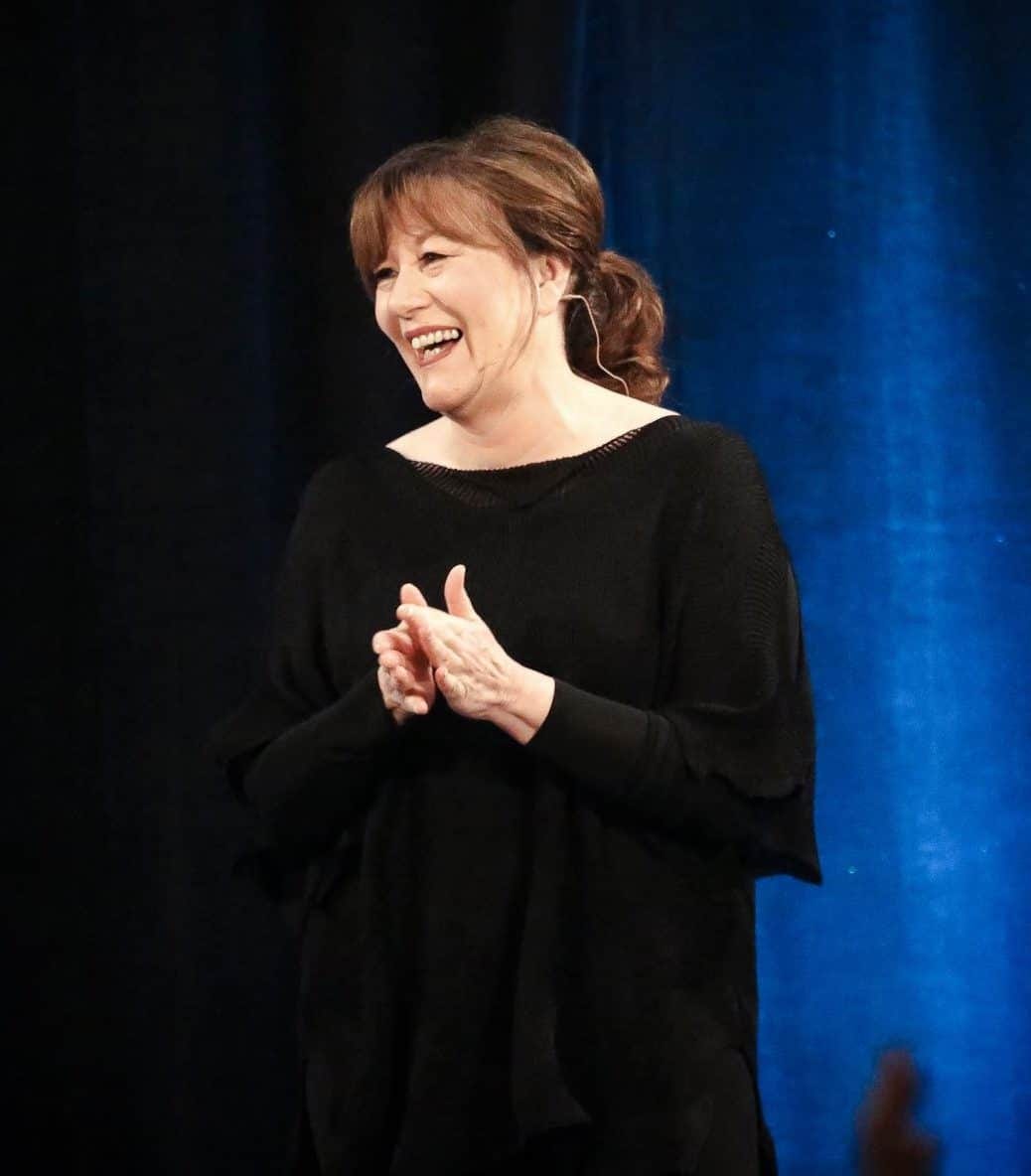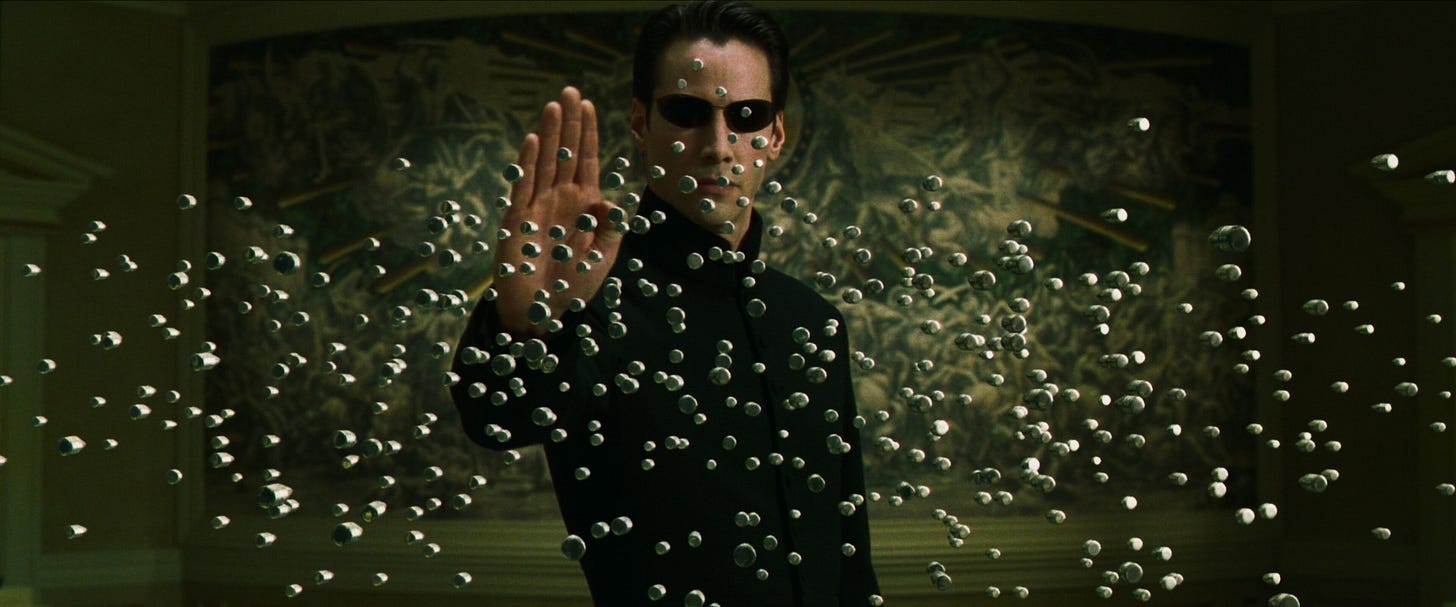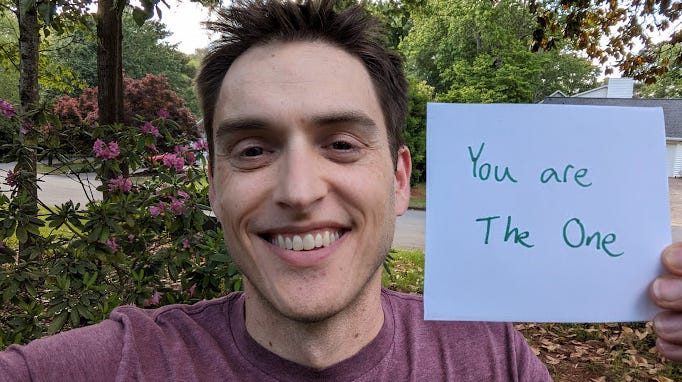(8 min read)
What you believe
Sometimes people (such as prospective employers) ask me:
What are you particularly good at?
What is your superpower?
My answer is that I change my mind.
Strong opinions, loosely held.
I’m not too stubborn to acknowledge (privately and publicly) that my past self was foolish.
For example.
As a young person growing up in the South (North Carolina, Texas, and Georgia), I identified more as conservative than progressive.
More Republican than Democrat.
Then I went to Princeton.
Got into a bunch of arguments.
Received new insights.
Changed my mind.
Now I’m progressive.
You could say something similar happened in terms of religion.
Both sides of my family are Catholic (Irish Italian).
I grew up hearing from everyone in the South that “Christian = good person”.
When I was little, I didn’t even know what religion was.
Just that you weren’t a good person if you weren’t Christian.
The more I learned over the years, the more I rejected any kind of organized religion.
So you could call me atheist or agnostic.1
A more recent big flip for me
Sometime 10-14 years ago, my partner Katie and I started having really heated conversations on a particular topic.
She had shared with me that she liked a teacher that went by the name of Abraham-Hicks.
There was this concept called “Law of Attraction”.
I felt so confused.
How could this person that I admire and respect so much (my life partner) also be someone who gets swept up in this weird hand-wavy idea that positive thinking magically brings what you want?
She thought I was attacking her. Or at least disappointed in her.
My tone of voice must not have been warm and curious.
But truly, I wanted to reconcile the discrepancy between us.
What was she seeing that I wasn’t?
So, we continued working through it over many uncomfortable conversations.
Katie encouraged me to read a book by Esther Hicks.
Then Katie and I even paid to attend a live event together.
Let me tell you.
It blew my fucking mind.
I’m used to surrounding myself with super sharp people.
The folks at Princeton were impressive.
My coworkers at Bridgewater even more so.
(Ray Dalio is a mental ninja.)
Witnessing Esther Hicks immediately answer any question on any topic was jaw-dropping.
In my mind, she belongs in the same league as Ray.
One of the most extraordinary people I’ve ever met.
I love the word “yet”.
Esther often made comments that felt “off” to me.
My approach was: I could ignore the parts that didn’t resonate with me.
When something doesn’t resonate with me, I assume “it doesn’t resonate with me … yet” (keeping an open mind).
So, when Esther claimed that she was a human who was “channeling” a “collective consciousness” of “infinite intelligence” that goes by the name of Abraham, I figured (and still figure):
Sure, if you say so.
Instead of evaluating that (and her usage of weird concepts like “everything you want is waiting for you in your ‘vortex’”), I focused on:
If I ignore (for now) anything that I don’t feel comfortable embracing, and if I just ask how valuable her practical advice is…
How much do people appreciate her coaching? Is she helping the world?
How much have I benefitted from her perspective?
How much would I love to have her at my side as an advisor?
The answer is clear.
And it’s 180º flipped from my original opinion about this whole field.
Back when I’d reacted negatively to Katie, I was almost throwing the baby out with the bathwater.
I’m so glad I didn’t.
Every day now, I still take advantage of Esther’s teachings.
She has quite a way with words.
Some of my favorite quotes:
‘Don’t I have to sacrifice doing things I want to do by doing things I don’t want to do in order to get ahead?’
And we say the only thing you have to sacrifice is your unhappiness.
Sacrifice it! Let it go! Give it up!
‘I’ll give up all of my misery for the joy that is natural to me.’
That is the message.
So you have to sacrifice negative conversations.
You have to sacrifice negative thoughts.
You have to sacrifice those memories that hurt your feelings.
You have to sacrifice stewing over things and brooding over things.
You have to sacrifice all that misery for your joy because you can’t have both; it’s one or the other.
and
You don’t have to figure it all out this red-hot minute.
and
You’ll never get it all done, so you can’t get it wrong.
and
Reach for a better feeling thought.
and
Let go of the oars; everything you want is downstream.
Science is converging with the mystical
It still bugs me (although I wish I could say otherwise) when people in the “law of attraction” community pretend to know more than they do.
Audience members raise their hands to ask Esther a question.
They talk about “quantum mechanics” as if it’s something that they understand.
I suspect that they haven’t taken a single science course after high school.
Yet they speak as if they have mastered the concepts of “entanglement”, “superposition”, “wave-particle duality”, and more.
Bullshit.
It’s hard not to roll my eyes when I hear those audience members. 🙄
Using terms you don’t understand is no more helpful than when people create mythology or religion.
It’s just slight-of-hand.
However.
Let’s set aside my annoyance.
It doesn’t matter if they’re clueless.
Just parroting words like a child.
Even though to me it looks like they’re fumbling around in the dark, they might actually be getting close to the truth (whether they really understand it or not).
The more I learn about hardcore science (whether from free MIT courses online or as dumbed down in YouTube videos like I’ll share here), the more it seems to me that cutting-edge science is starting to say the same thing as Esther Hicks (and other people like her), even at her weirdest.
The latest math and science
The 2022 Nobel Prize in Physics is summarized as “The Universe Is Not Locally Real, and the Physics Nobel Prize Winners Proved It”. Trippy stuff there.
Let’s look at something even more recent and more interesting.
Donald Hoffman is a cognitive psychologist and professor in the Department of Cognitive Sciences at the University of California, Irvine, with joint appointments in the Department of Philosophy, the Department of Logic and Philosophy of Science, and the School of Computer Science.
Hoffman studies consciousness, the mind–body problem (the philosophical problem concerning the relationship between thought and consciousness in the human mind, and the body), visual perception, and evolutionary psychology using mathematical models and psychophysical experiments.
I’ve spent many hours watching him speak.
My take:
He has genius-level mental horsepower
He is methodical and rigorous
He is extremely open-minded and able to use zeroth principles
He is curious and minimizes his ego and is as eager to prove his hypotheses wrong as he is to prove them right
If you ignore the Tom Bilyeu’s obnoxious misleading clickbait title and thumbnail and watch this compilation of Donald Hoffman interviews, Hoffman will blow your mind:
Unlike nearly every other human in history, Donald does not assume that physics is real.
Spacetime might be an illusion.
I.e. maybe there is no “time”, and maybe we don’t live in 3 dimensions of space.
In other words, there are no humans and therefore no brains, and therefore consciousness is not a product of a brain.
Instead, the brain is a product (via imagination) of consciousness.
None of the physical universe exists.
He and his team will continue exploring and check where that theory takes them.
You are The One
I hadn’t noticed the coincidences until I started writing this post.
In The Matrix, Neo wonders if he is “The One”.
He has superhuman power because he realizes the truth about reality.
When people in Esther’s audience raise their hands to indicate that they’d like to come up on stage and ask a question, Esther chooses by pointing to an individual and declaring “You are the one.”
And Donald Hoffman, a leading-edge scientist I respect as much as any other, describes consciousness as The One.
According to the hypothesis that he’s testing, we each are not separate humans, because we’re not humans at all.
There is just one consciousness that is exploring itself and playing with different umwelts.
(E.g. humans have only 5 senses, while other animals can see infrared or ultraviolet light or have sonar or magnetic sensors and so on. There are infinite varieties of conscious experience.)
I envision it as a giant octopus holding sock puppets (not just 8 but infinite) and creating drama between each of the puppets.
Who knows.
Anyway…
Wrapping your head around it
It had been bothering me that Esther sometimes would say that time was an illusion but then sometimes she’d talk about how consciousness was expanding and exploring.
How could that be?
If there is no arrow of time, how could there ever be expansion of anything?
If everything is static, how is anything ever new?
And yet Hoffman said the same!
He suspects there is no “time”, but still, consciousness is able to explore.
It’s fun to watch intellectual powerhouses pursue concepts beyond the 4-dimensions of spacetime that we mere mortals are familiar with.
Hoffman grappling with the question:
Our whole intuition about an arrow of time need not hold in this realm.
So when we talk about the notion of Consciousness exploring for the joy of it, we’re going to have to rejig how we think about the notion of—for us, exploration is something that happens in an arrow of time.
Can we wrap our heads around the notion of exploration where we let go of an increasing entropy kind of thing?
I don’t know if we can.
Maybe you just have to let go of this headset altogether [our limited 5 senses] to really get that.
But is it possible while we’re under the limits of this headset to wrap our minds around—we can at least get pointers to that idea.
Our mathematics led to this pointer, and I would never even have gone there unless the mathematics took me there.
So I would say that it’s just like: the amateur astronomer with a pair of binoculars could be brighter than the guy with the James Webb Space Telescope, but he’s never going to beat the guy with the James Webb Space Telescope because the guy’s got better tools.
And that’s what science does for you.
You may be smarter than Einstein, but if you don’t actually put yourself—using the tools of mathematics and so forth—that genius will never actually flower in the sense of reaching all the potential implications of what it means.
And so that’s why we we do science the way we do it with mathematical precision.
For two reasons:
If our ideas are good, we probably don’t understand all their implications, and so the math will come back, and it’ll be our teacher.
And second: certainly our ideas have their limits, and it’s hard for us to understand what the limits are.
In good cases, the math will come back and tell us what those limits are.
For example, Einstein’s theory of gravity, together with quantum field theory, tell us 10^-33 cm, and spacetime is over; it has no operational meaning.
Who could have guessed?
Could you have guessed?
Could Einstein have guessed “oh yeah, I have an idea about spacetime, but at 10^-33 cm, it’s going to fall apart”.
Not even an Einstein could guess that.
That would only come through taking your ideas, doing the travail.
I mean Einstein—really, it was a birthing process.
It was very, very hard to give birth to general relativity, and many mathematicians working in physics and so forth say the same thing.
You’re working in the dark.
It’s hard. You’re struggling, and then all of a sudden, if you’re lucky, you get that breakthrough.
And you see things.
But then it comes back.
And you learn the limits of the basic concepts that you started with, and then you reboot from a new set of assumptions.
So Hoffman and scientific pioneers find themselves attempting to come up not with a Theory of Everything (which is provably impossible), but a Theory of Everything within spacetime.
Hoffman does a better job than new age teachers like Hicks at teaching concepts like:
Kurt Gödel's incompleteness theorems (In any formal math system, there are true statements that cannot be proven within that system, and you cannot prove the consistency of the system using its own rules.)
Infinity (and how some infinities are larger than others: https://en.wikipedia.org/wiki/Cantor's_theorem)
time being an illusion
But to be honest, scientists and spiritual teachers are starting to sound more similar to me than different.
By the way, you might enjoy a post I wrote mentioning Hoffman last summer:
And this more recent post that linked to an Alan Watts lecture where he proposes an idea similar to Hoffman’s:
🕙 What we learned in recent posts:
🟢 5 mental shifts that saved my (physical) life
👀 Caught my eye this week:
Videos from Veritasium similarly start to sound mystical and woo-woo as they teach about astronomy (or quantum mechanics or any other difficult science).
I learned from Professor John Gager at Princeton that the general public’s usage of the words “atheist” and “agnostic” gets messy, especially given that most people don’t consider that there is 2x2 matrix with “theist” and “atheist” on one axis and “agnostic” and “gnostic” on the other axis. For example:
Gnostic Atheist: Someone who does not believe in the existence of any gods and claims to have knowledge or certainty that no gods exist.
Agnostic Atheist: Someone who does not believe in the existence of any gods but claims to have uncertainty or lack of knowledge about the existence of those gods.









Very interesting. I've read quite a bit of LOA stuff and it is intriguing. Esther Hicks was in the original version of The Secret, but then was removed over a falling out, I believe. Not sure why.
This confusion is one I grapple with constantly. I too feel scared to fully accept the teachings of Abraham Hicks and Vadim Zeland, but there's no denying that consistently practicing their teachings is changing my life. Faster than any other methods. Sustainably, too. It drives me crazy...you can't really explain it scientifically. It's honestly kind of embarrassing sometimes. My husband is kind of like you, Ryan, and I'm like your partner. Skeptical about "consciousness" but noticing the rapid change. Open to possibility. It's a conversation that may may join religion and spirituality forever. Where in Georgia did you live? I'm from Atlanta :)